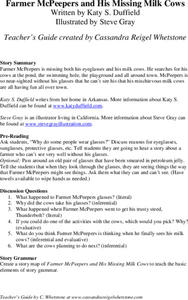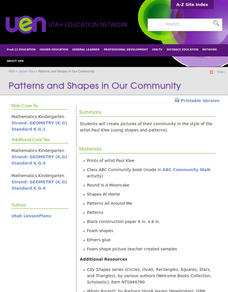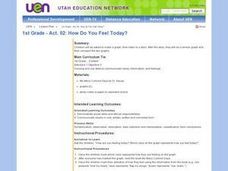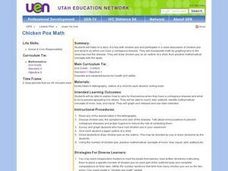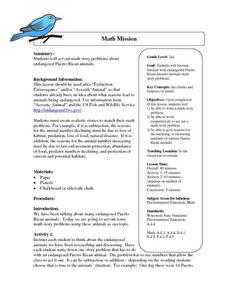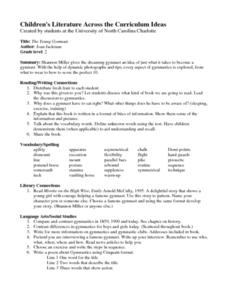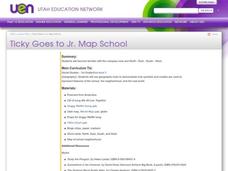Cassandra Reigel Whetstone
Farmer McPeepers and His Missing Milk Cows
Pair your reading of Farmer McPeepers and His Missing Milk Cows with the questions and activities provided here. Learners answer questions about the text, create story maps, put together brochures, relate math to the story, practice some...
Curated OER
Children's Literature Across the Curriculum Ideas
You can keep this printable idea sheet and use when you're in a tight spot. It contains cross-curricular ideas that span every subject while relating to the African tale, "Anasazi the Spider." Learners will act, write, move, count, and...
Utah Education Network (UEN)
Patterns and Shapes In Our Community
Shapes in art, shapes in stories, shapes in the environment, shapes all around. A multi-part instructional activity that includes looking at the artist Paul Klee's work, reading books about shapes, taking a walk in the neighborhood and...
Curated OER
Adjective Monster
Explore descriptive writing and visual art. Listen to the story Go Away Big, Green Monster by Ed Emberley and generate a list of adjectives used in the book. Name familiar shapes and create a shapes list. Choose an adjective and shape to...
Curated OER
Welcome to My World!
Students use maps to locate information. They read the story, "It Looked Like Spilt Milk", view images of the continents and discuss the various continents. Afterward, they make their own Atlas to record information that they can later...
Utah Education Network (UEN)
Place Value is as Easy as Pie
After reading a short story, "Race for the Pie!," learners help the main character, Chett, win a cherry pie by counting out cherries. Cheery cherry cards and a game board are included for you to print out as manipulatives. The goal of...
Alabama Learning Exchange
Tiger Math Graphing
Learners practice various skills using the book Tiger Math: Learning to Graph from a Baby Tiger. After listening to the story, they create a pictograph using data collected from the text. They also color a picture of a tiger, collect...
Curated OER
Why Walk?
Following the story Yummers, pupils will use the food pyramid to evaluate what Emily Pig ate during her walk and find out why her walk made her sick. They will then participate in a walking game.
Curated OER
Chicken Pox Math
Students will listen to a story of a boy with chicken pox and participate in a class discussion of chicken pox and what to do when you have a contagious disease. They will incorporate math by graphing who in the class has had the...
Curated OER
Chrysanthemum and Letter Tiles
Students listen as the teacher reads Chrysanthemum. They discuss the story, focusing on the length of Chrysanthemum's name. They compare the lengths of their own names using letter tiles, grid paper, and a class graph.
Curated OER
How Do You Feel Today?
Students create a graph, then listen to Dr. Seuss' book, My Many Colored Days. After the story, they do a similar graph and then compare the two graphs.
Curated OER
Chicken Pox Math
Second graders are read a story about a boy with chicken pox. As a class, they discuss what to do when you have a contagious disease and identify who in the class has had chicken pox. Using this information, they create a graph and use...
Curated OER
Math Mission
Second graders investigate the concept of Puerto Rican animals through using math word problems. They create a story to correlate with the word problems. The lesson also uses data of species counts to show increases and decreases for...
Curated OER
Apple, Apples Everywhere!
Students listen to the story of Johnny Appleseed. They create a chart of students favorite apples. They access the Internet and research nutritional information and facts about apples.
Curated OER
Enhancing Writing Through Technology
Students participate in a class survey of their favorite activity to do in the snow and organize the results in a graph. They write a paragraph about the graph using language from a class-developed word web and include both an opening...
Curated OER
Using R&R to Teach Mathematics
Second graders create a shape garden. In this polygons lesson, 2nd graders practice making shapes using a geoboard and read the book The Greedy Triangle by Marilyn Burns. Students also design a shape garden using construction paper.
Curated OER
Exploring the Sky: Reading Maria's Comet
Discover the science behind astronomy. After reading the book Maria's Comet, which is about a young woman who breaks new ground by becoming a female astronomer, young learners practice reading comprehension with worksheet questions about...
Utah Education Network (UEN)
Geo Shapes
Invite your first graders to compose and decompose two and three-dimensional figures with this fun, hands-on lesson. They investigate and predict the results of putting together and taking apart two-dimensional shapes with rubber bands...
Curated OER
The Young Gymnast
Second graders compare and contrast gymnastics in 1859, 1900 and today. Students contrast differences in gymnastics for boys and girls today. Students pretend that they are interviewing a famous gymnast and write up their interview....
Curated OER
Children's Literature Across the Curriculum Ideas-If You Made A Million
Students read If You Made A Million by David M. Schwartz. They complete a variety of cross-curricular activities surrounding the study of earning, saving and spending money. Included are reading, art, math, science, writing, social...
Curated OER
Cut - Stretch - Fold
Students work on determining the area of a tangram piece without using a formula by working with geoboards, graph paper, and tangram pieces. After completing the activity, they apply their experience to determining a formula for finding...
Curated OER
Long Train: 101 Cars on the Track Lesson Plan
Students practice counting, measuring, and predicting. In this early childhood lesson plan, students identify numbers 1-101, rhyming words, and repetitive words using Long Train by Sam Williams. Students build their recall skills by...
Curated OER
Ticky Goes to Jr. Map School
Second graders explore the compass rose and North - East - South - West.
Curated OER
That's So Square
Students familiarize themselves with the three most common geometric shapes: circles, triangles and parallelograms. They sketch, sort, and name the shapes.
Other popular searches
- Second Grade Story Summary
- Short Story Summary
- Writing Story Summary
- Story Summary Sheet
- Nonfiction Story Summary
- Story Summary Organizer
- Story Summary 1st Grade
- Story Summary Fruitcake
- Teaching Story Summary
- Summary Story Frame
- Summary of Pinocchio Story


